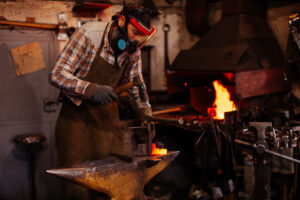
It is a craft that many associate with medieval times but, since the start of the pandemic, blacksmithing has made a comeback among young people.
Britain’s first blacksmithing apprenticeship is set to launch this year as rising numbers of young people turn to traditional crafts. In the four-year course, apprentices will be taught how to forge, form, cut and join materials, as well as learn wider business skills including marketing and design.
Apprentices will spend about eight weeks a year at a college and the rest of the year as working blacksmiths, completing skills-based assessments at the end of their courses. They will receive government grants to pay for the cost.
Adrian Legge, chairman of the blacksmith apprenticeship employer group, said that the move provides important recognition for the craft. “Most employers don’t have the facilities or time needed to do the breadth of off-the-job training,” he said. “Any training provider can offer to do it, but with a small craft like this, no college is going to run a course for just one student in their area — it’s not cost-effective.”
Aspiring blacksmiths can take courses at BTEC level 2 or 3, roughly equivalent to GCSE or A-level respectively, or study an undergraduate or master’s degree in artist blacksmithing or metalsmithing at a few select colleges.
“There isn’t that supported paid-training route,” Legge said. “Work gets you good and it gets you there quick but it usually only does that for quite a narrow range of skill-sets. What colleges do is they give a broad-based education and knowledge base, but they won’t necessarily get you very good and quick at the craft.”
The number of people taking up apprenticeships has increased by more than 25 per cent during the pandemic, thanks to grants now available for employers and more course places for school-leavers seeking new careers.
It is hoped that the new apprentices will fill shortages in sectors such as manufacturing. “We particularly rely on level 3 and level 4 skills, which are traditionally produced through apprenticeship training programmes,” Stephen Phipson, head of the manufacturers’ association Make UK, told the Treasury committee’s inquiry into jobs, productivity and growth.
“We’ve been quite good at developing grad-level engineers. The gaps are at vocational levels — that’s where we need some fixing.”
The Heritage Crafts Association, which represents tradespeople working in traditional crafts, introduced a new membership grade this year for trainees and students to meet rising demand from young people wanting to learn crafts ranging from blacksmithing to basketry and weaving.
Ben Perkins, 17, from Guildford in Surrey, began blacksmithing in his garden in 2018. He said: “I’ve always been making things. Blacksmithing seemed like fun because it’s fire and sparks.
“The first thing I needed to make was the forge to get the metal red-hot. So I dug a hole in the ground and put coal in it and then got my mum’s old hairdryer to use as an air supply, because it helps the coal to get even hotter.
“After I’d done that, I used an old fencepost as an anvil, and that was my starting set-up.”
Perkins then went on a forging course, which confirmed to him that he wanted to pursue blacksmithing. He started off making bottle-openers and door handles before learning how to make sculptures. He now takes commissions for custom jewellery and is working to expand the range of products he can offer.
He said: “When lockdown started, I was in my GCSE year at school. When my exams were cancelled it meant I had more time to put towards my craft, so I started making bottle-openers with more complex designs.
“Now I am making little sculptures and things like that. I’ve been doing lots of jewellery work, making rings and necklaces.
“I’m also getting commissions. My first customer was from the United States, after I posted a photo on Reddit of a snail I’d made. I wasn’t offering it for sale but someone asked if they could buy it and I thought, ‘I guess so.’ ”
Perkins has met a number of other young blacksmiths through Instagram, where he shares his work under the handle @ben.makes.
“I’d love to expand it in the future and maybe even have someone work with me to make things and offer them internationally.
“I like that, because if I was a village blacksmith I’d only be offering things to people locally, but with the internet you can have customers from all around the world.”
The first blacksmithing apprenticeship will launch at Herefordshire, Ludlow and North Shropshire college next September, where discussions are underway with employers to put together a cohort of students.
Read more:
Young are forging a route to careers in traditional crafts
